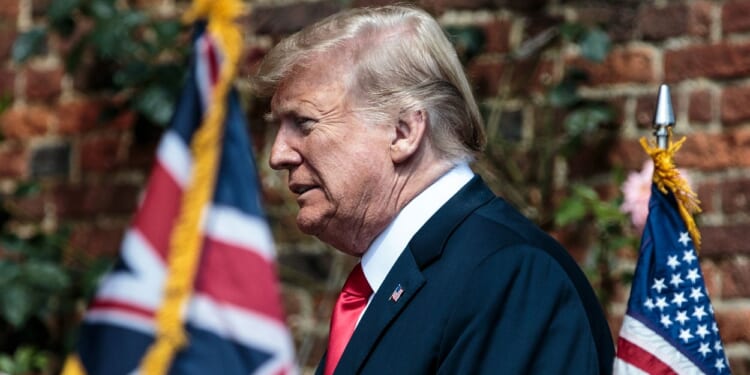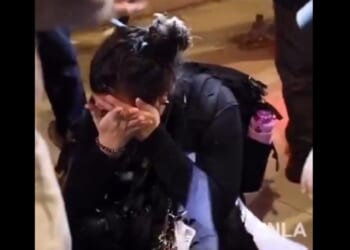It looks like there’s big, Trump-sized trouble in store for the BBC.
On Monday, President Donald Trump threatened the government-funded British Broadcasting Corporation with a $1 billion lawsuit over its broadcasting of an edited version of his speech near the Capitol on Jan. 6, 2021.
The BBC edit made it look like Trump was directly calling for violence that day. The Telegraph blew up the story after it revealed an internal BBC document provided to them by a whistleblower found that the clip was highly misleading to the public.
“The dossier said the programme made the US president ‘”say” things [he] never actually said’ by splicing together footage from the start of his speech with something he said nearly an hour later,” the Telegraph reported.
That wasn’t all.
The BBC standards committee also found that the media outlet had been rampantly publishing Hamas propaganda as fact. In the last two years, Telegraph reported, BBC had to correct 215 stories related to the Israel/Hamas conflict, about two a week.
To top in all off the internal review found that a group of pro-LGBTQ reporters effectively use their own censorship of the issue and clamp down on any reporting that conflicts with their worldview.
This has led to, according to the internal report, “a constant drip-feed of one-sided stories … celebrating the trans experience without adequate balance or objectivity.”
BBC didn’t deny the report and admitted that it made an “error of judgment” with the edited Trump speech.
I’d say this is all shocking but not surprising. Still, the situation was apparently bad enough that on Sunday Director General Tim Davie and other members of BBC leadership resigned.
Former UK Prime Minister Liz Truss demanded the end to “nationalized broadcasting” on X.
This scandal, really set of scandals, is particularly rich given the viciously censorious state of the U.K.
In the last few years, British citizens have been arrested for opposing LGBTQ ideology on social media, they’ve been hounded by police, and are indeed going on a “very dark path” as Vice President J.D. Vance said in August.
This while their own state funded media is clipping together deceptive clips of the American president, carrying water for an Islamist terror organization, and squelching criticism of transgender ideology.
Reform U.K. leader Nigel Farage has compared the UK’s increasing censorship to North Korea and other tyrannical regimes. Maybe it’s hyperbole, but that assessment gets worryingly closer to the mark every day.
No surprise, left-leaning media was full of excuses for BBC and tried to make the story about mean old Trump and the Right picking on a venerable, but benighted media organization.
Many are angry that the BBC has responded at all to the Telegraph and Trump. Pay no attention to the bias—and in some cases dishonesty—they seem to be saying, just let it slide because everyone knows Trump is just the worst.
One writer in the leftist Guardian acknowledged that mistakes were made at the BBC, but raged that the “political campaign against the publication “could act as a textbook example of how to confuse and undermine the kind of journalism that is, at the very least, aiming for impartiality in a sea of spin and distortion.”
This is all incredibly revealing about what’s gone wrong with so many Western institutions. They have become, especially in recent years, hopelessly biased and monolithic in their political culture. Issues that divide the public or are considered incredibly toxic are taken as a given in elite institutions like the media.
Any opposition to what they see as a self-evident truth, like that a man can become a woman if he feels like it, is treated as unacceptable bigotry. Publications like BBC skew their coverage very much leftward, but act confused and bewildered when they are told they are biased.
Big changes are happening in the U.S. as at least some of the woke fever dream of the post-George Floyd era is starting to end. Americans made it clear that they see through it and won’t tolerate this dynamic anymore.
Americans finally pulled the plug on its own publicly funded media when it defunded NPR and the Corporation for Public Broadcasting this year. Their bias had been laughably obvious for a long time, but I suppose good on Republicans in Congress for finally cutting the taxpayer funded gravy train as they should have done long ago.
That pivot point hasn’t arrived in the U.K. yet. BBC continues to receive significant public investment, though its royal charter ends in 2027. Some have argued that BBC needs to reformed rather than be defunded.
While I’m not British, I disagree with that strategy.
During an age in which so many institutions—including and perhaps especially public media—have dropped any pretense of balance, one can’t expect the people to keep forking over their money to organizations that seemingly want people like themselves to disappear.
And it should be clear at this point that these institutions are resistant to even admitting that they have a problem. They become increasingly strident until faced with a crisis or reckoning—usually in the form of a collapsing business model or a sudden rug pull of taxpayer money.
Only then are even the most minor changes made. So perhaps the U.K. will defund the BBC as the U.S. defunded NPR. It would be a good first step toward abandoning the censorship regime that’s been hiding in plain sight.








